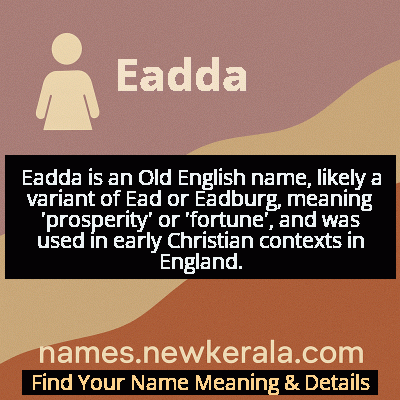Eadda Name Meaning & Details
Origin, Popularity, Numerology Analysis & Name Meaning of Eadda
Discover the origin, meaning, and cultural significance of the name EADDA. Delve into its historical roots and explore the lasting impact it has had on communities and traditions.
Name
Eadda
Gender
Female
Origin
Christian
Lucky Number
6
Meaning of the Name - Eadda
Eadda is an Old English name, likely a variant of Ead or Eadburg, meaning 'prosperity' or 'fortune', and was used in early Christian contexts in England.
Eadda - Complete Numerology Analysis
Your Numerology Number
Based on Pythagorean Numerology System
Ruling Planet
Venus
Positive Nature
Harmonious, responsible, caring, and artistic.
Negative Traits
Overly idealistic, superficial, possessive, or jealous.
Lucky Colours
Pink, turquoise.
Lucky Days
Friday.
Lucky Stones
Diamond, turquoise.
Harmony Numbers
2, 3, 9.
Best Suited Professions
Artists, musicians, teachers, healthcare workers.
What People Like About You
Warmth, nurturing nature, artistic flair.
Famous People Named Eadda
Eadda of Mercia
Anglo-Saxon noblewoman
Patron of early English Christianity and founder of religious houses
Eadda the Wise
Scholar and scribe
Illuminated manuscripts and religious texts preservation
Saint Eadda
Christian saint
Miracles and establishment of pilgrimage sites in England
Name Variations & International Equivalents
Click on blue names to explore their detailed meanings. Gray names with will be available soon.
Cultural & Historical Significance
Eadda represents a bridge between ancient Germanic naming customs and the new Christian identity taking shape in medieval England. The name appears in various historical records, including the Anglo-Saxon Chronicle and ecclesiastical documents, often associated with women of noble birth who played significant roles in the Christianization of England through patronage and religious foundations. These women typically came from wealthy families who used their resources to support the growing Christian church, establishing monasteries, funding religious art, and supporting missionary work.
The cultural significance of Eadda extends beyond its literal meaning to represent the ideal of Christian stewardship - the responsible management of wealth for spiritual and communal benefit. In a society transitioning from paganism to Christianity, names like Eadda helped integrate traditional values of prosperity with new Christian ideals of charity and spiritual wealth. The name's persistence in historical records indicates its importance in early English Christian society and its association with women who wielded significant influence through both their economic resources and religious devotion.
Extended Personality Analysis
Individuals named Eadda are typically perceived as grounded, practical, and resourceful. They often exhibit a strong sense of responsibility and natural leadership qualities, combined with a deep appreciation for stability and security. Their name's meaning of 'wealthy' manifests not just in material awareness but in rich inner lives and abundant relationships. Eaddas tend to be excellent managers of both resources and people, showing wisdom in decision-making and a talent for creating prosperous environments around them.
These individuals often possess a quiet confidence that draws others to them for guidance and support. While practical and down-to-earth, they also maintain strong spiritual or philosophical foundations that guide their actions. Their combination of pragmatic thinking and deep values makes them particularly effective in roles requiring both practical management and ethical leadership. Eaddas typically value tradition and continuity while being open to measured progress and improvement.
In relationships, Eaddas are known for their loyalty and generosity, often serving as the stable center of their social and family circles. They have a natural ability to nurture growth in others and create environments where people and projects can flourish. Their approach to life is characterized by careful planning and thoughtful execution, avoiding rash decisions while remaining open to opportunities. The historical weight of their name often gives Eaddas a sense of connection to larger traditions and values, which they typically embody through their actions and choices.
Modern Usage & Popularity
In contemporary times, Eadda remains a rare but meaningful choice, primarily selected by parents interested in historical names, Anglo-Saxon heritage, or unique Christian names with deep roots. While not appearing on modern popularity charts, it enjoys a niche following among historians, medieval enthusiasts, and those seeking distinctive names with strong meanings. The name has seen slight resurgence in recent years as part of the broader trend toward vintage and historical names, particularly in the United Kingdom and among communities with English heritage. Modern Eaddas often appreciate their name's uniqueness and historical significance, though they may need to frequently explain its pronunciation and origin. The name's rarity makes it stand out while its meaningful etymology provides a conversation starter about English history and linguistic heritage. Contemporary usage tends to be concentrated among families with specific interests in medieval history, Old English literature, or those seeking a name that combines Christian significance with ancient English roots.
Symbolic & Spiritual Meanings
Symbolically, Eadda represents abundance in its fullest sense - not merely material wealth but richness of character, spiritual depth, and meaningful relationships. The name embodies the concept of 'true wealth' as encompassing wisdom, integrity, and lasting legacy. In metaphorical terms, Eadda symbolizes the fertile ground from which prosperity grows - suggesting that genuine abundance springs from strong foundations, careful cultivation, and ethical stewardship. The name carries connotations of inheritance and continuity, representing both what is passed down through generations and what one builds through personal effort and virtue. In spiritual contexts, Eadda can symbolize divine blessing and the multiplication of gifts when used wisely. The name also represents the idea that true prosperity involves balance - between giving and receiving, tradition and innovation, practical matters and higher purposes. This symbolic richness makes Eadda a name that speaks to both earthly success and spiritual fulfillment, representing the ideal of prosperity that benefits both the individual and the community.

